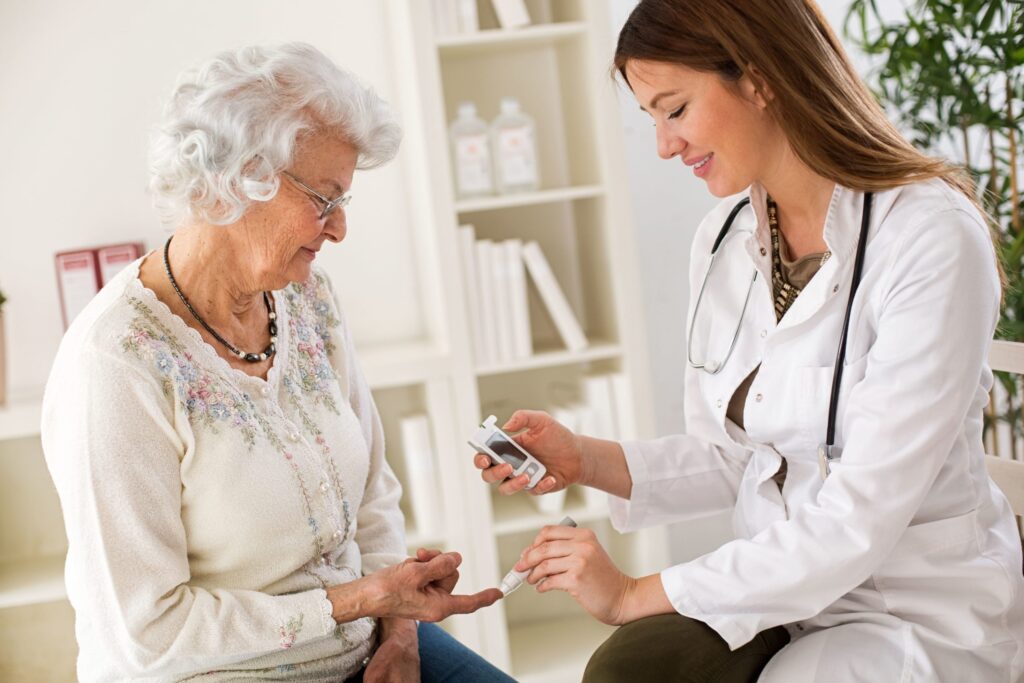Elderly Diabetes Care
Blood sugar control and silver linings: managing diabetes in older adults
Our bodies change in a number of ways as we get older. Managing diabetes in its affected population necessitates a customised strategy that takes these modifications into account. This guide offers ideas for supporting healthy ageing with diabetes and examines the special issues for geriatric diabetes treatment.
Table of Contents

Why Do Older Adults’ Diabetes Management Needs Differ?
Elderly Diabetes Care
- Age-Related loss: Diabetes management may be impacted by altered metabolism, decreased physical activity, and possible cognitive loss.
- Multiple Medications: Elderly persons frequently take many medications for different health issues, thus careful medication coordination is necessary to prevent drug interactions.
- Sensory Issues: Blood sugar monitoring and medicine administration can be more difficult when there are vision or hearing limitations.
- Social and Emotional Factors: Self-care practices may be adversely affected by social isolation, depression, or anxiety.
Techniques for Managing Diabetes Effectively in Older Adults
Elderly Diabetes Care
- Personalised Care Plans: Develop a diabetes care plan that takes into account your unique requirements and abilities in collaboration with your physician and a diabetes educator.
- Pay Attention to Blood Sugar Management: To maintain ideal control, check blood sugar levels frequently and make any adjustments to prescriptions or lifestyle choices.
- Simplified Medication Regimens: To increase adherence, talk about ways to make medication schedules easier to follow or to use combination drugs.
- Put Nutrition First: It’s important to eat a balanced diet with portion amounts that correspond to age. In order to create customised meal plans, think about speaking with a licenced dietician.
- Sustaining Physical Activity: Frequent exercise has a major positive impact on blood sugar regulation and general health, even in modified forms like walking or chair workouts.
- Helping Technologies: To address age-related obstacles, make use of equipment like glucose sensors, spoken medicine reminders, and large-print blood sugar monitors.
- Mental and Emotional Health: Take care of mental health issues such as anxiety or depression, as these can have a big influence on diabetes treatment.
- Social Support: To prevent loneliness and encourage good ageing, foster social engagement and involvement in senior centres or support groups.
Extra Things to Think About for Diabetes-Affected Older Adults
Elderly Diabetes Care
- Foot Care: To avoid diabetic foot issues, regularly check your feet for injuries and practise excellent hygiene.
- Dental Care: Gum disease can make it more difficult to regulate diabetes, so it’s important to have regular dental checkups and practise good oral hygiene.
- immunisations: To lower your risk of infection, make sure you are up to date on your immunisations, especially the ones for pneumonia and influenza.
The Function of Nurses
Elderly Diabetes Care
Some older persons may need carer assistance in managing their diabetes. Here are some pointers:
- Education and Training: Appropriate instruction on managing diabetes, administering medications, and identifying potential complications should be given to carers.
- Open Communication: Keep lines of communication open with carers regarding the older patient’s individual needs and diabetes management strategies.
- Emotional Support: Offer assistance and direction to carers who could encounter difficulties when taking care of an older diabetic adult.
Recall:
Elderly Diabetes Care
Diabetes management can be successful and contribute to a healthy and full life with appropriate care planning and coordination between healthcare experts, carers, and the aged person.
Seniors with diabetes and those who care for them can access a wealth of information. Never be afraid to ask your physician, diabetes educators, or local organisations for assistance.
Notice: This information is not meant to replace expert medical advice; rather, it is meant mainly for general awareness. Always discuss your particular case with your doctor, and heed their advice.


